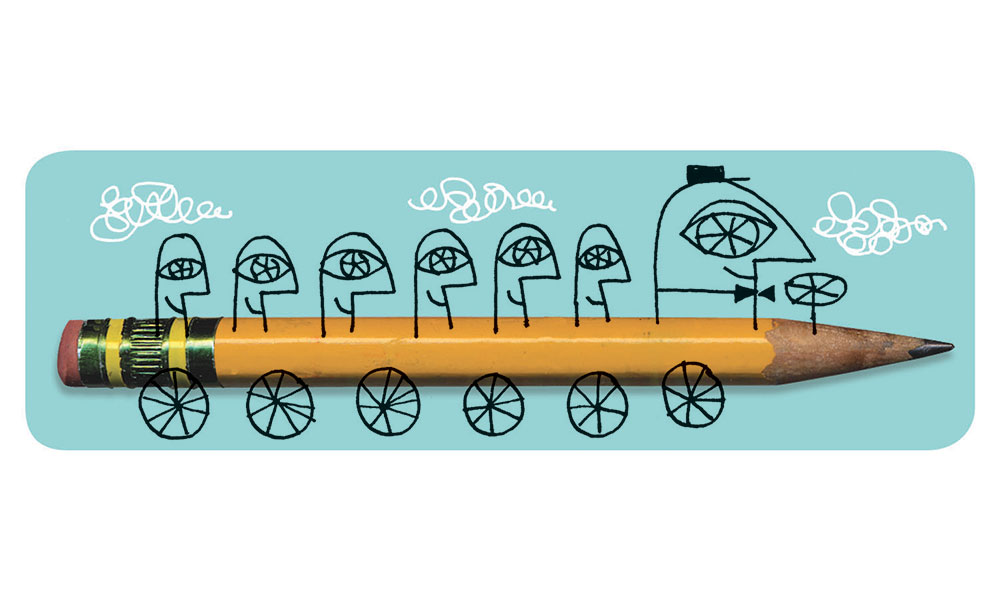Motivating middle schoolers
Researchers, local teachers team up to elicit students' best efforts
Education
SUMMARY: Three years ago, psychology professor Kenn Barron and his colleagues at JMU's Motivation Research Institute began working with a group of teachers at Thomas Harrison Middle School in Harrisonburg who had identified a mindset of failure among some of their students. With the help of the MRI research team, students at THMS are being introduced to growth-mindset thinking, which has led to better performance on homework, quizzes and tests, as well as standardized assessments.
From the Spring/Summer 2016 print issue of Madison.
One of the challenges in K-12 education involves teaching students who believe they can’t learn. Many schools reinforce this mindset of failure by classifying children from a young age as non-college-bound or remedial, and teachers may unknowingly contribute to the problem by focusing their attention on high-achieving students.
Improving student motivation requires intervention and training. “In education, that means developing and nurturing the psychological skills necessary for students to be successful in the classroom,” says psychology professor Kenn Barron, co-founder of the Motivation Research Institute at JMU.
When deciding whether to complete a homework assignment, for example, a student might weigh motivational factors such as expectancy (can I do this?), value (do I want to do this?) and cost (what will it cost for me to do this in terms of time, energy and resources?). A lack of commitment in one or more of these areas can cause students to underperform and ultimately question their ability to succeed.
One of the ways to address low motivation, Barron says, is to encourage growth mindsets. The concept, introduced by Stanford psychologist Carol Dweck, is aimed at getting students to persist through rigorous learning challenges. Key to growth-mindset thinking is appreciating that effort and use of appropriate learning stragegies will lead to success rather than believing one’s success or failure is due to fixed, innate ability. “The growth mindset says to the student, ‘You can do this, you just may not have it yet,” Barron says.
Three years ago, Barron and Chris Hulleman, co-coordinator of MRI, began working with a group of teachers at Thomas Harrison Middle School in Harrisonburg—all of them JMU graduates—who had identified a mindset of failure among some of their students. The partnership set out to identify and test new strategies for helping those students “start strong, stay strong and finish strong” psychologically.
Their work soon captured the attention of the Carnegie Foundation for the Advancement of Teaching, which invited the Harrisonburg team to join a select group of school systems around the country as test sites in a Student Agency Improvement Community. SAIC is focused on bringing practitioners and researchers together to learn about the latest research in educational psychology, to test whether such ideas can be adapted to a given educational setting or student demographic, and to accelerate the rate of learning by sharing promising ideas across community members.
With the help of the MRI research team, practitioners at THMS have employed new tools, techniques and messaging designed to introduce students to growth-mindset thinking. In addition, teachers are learning how to redesign their classroom environments to promote growth-mindset thinking by reinforcing students’ effort and progress toward mastering the material rather than just focusing on the grade.
“We’re implementing a system where our students aren’t satisfied with anything less than their best effort,” said science teacher Carol Hall (’90), part of a group of eighth-grade educators at THMS who are teaming up to promote growth mindsets across content areas. “They’re receptive and appreciative, and their achievements are a source of pride.”
The data being collected at THMS by JMU co-researcher Thomas Hartka (’15) support that claim. Students experiencing growth mindsets are performing better on homework, quizzes and tests, as well as standardized assessments.
To begin scaling up the intervention, more than 200 fifth-graders at Thomas Harrison were introduced to growth-mindset thinking at the start of the 2015-16 school year. The app, which grew out of the researcher-practitioner partnership, is designed to reinforce the notion that students can effectively “grow their brains.” According to follow-up surveys and a drawing activity, 60 percent of participants reported an increase in growth mindset, while 20 percent moved from a fixed mindset to a growth mindset.
Pat Lintner, assistant superintendent of instruction for Harrisonburg Public Schools, said he wants to grow the program by making it more accessible to more teachers at more schools, including elementary and high schools.
